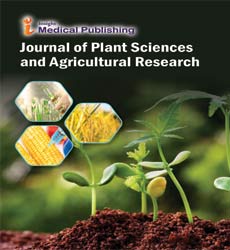The Process of Cultivation Usually involves Planting Seeds or Seedlings
Tony Chen*
Department of Molecular Sciences, Swedish University of Agricultural Sciences, Uppsala, Sweden
- *Corresponding Author:
- Tony Chen
Department of Molecular Sciences,
Swedish University of Agricultural Sciences, Uppsala,
Sweden,
E-mail: Chen_t@suas.sw
Received date: February 12, 2024, Manuscript No. IPJPSAR-24-18979; Editor assigned date: February 15, 2024, PreQC No. IPJPSAR-24-18979 (PQ); Reviewed date: February 29, 2024, QC No. IPJPSAR-24-18979; Revised date: March 07, 2024, Manuscript No. IPJPSAR-24-18979 (R); Published date: March 14, 2024, DOI: 10.36648/ipjpsar.8.1.133
Citation: Chen T (2024) The Process of Cultivation Usually involves Planting Seeds or Seedlings. J Plant Sci Agri Res Vol.8 No.1: 133.
Description
Plant-based production has become an increasingly prominent facet of modern agriculture and food systems, driven by a variety of factors ranging from health and environmental concerns to ethical considerations. This method of production involves cultivating crops primarily for human consumption, as opposed to raising livestock for meat, dairy, or other animalderived products. Here, we delve into the dynamics, benefits, and challenges of plant-based production.
At the heart of plant-based production lies the cultivation of fruits, vegetables, grains, legumes, nuts, and seeds. These crops serve as the foundation for a diverse array of plant-based foods, ranging from staples like rice and beans to more processed items such as plant-based meats and dairy alternatives. The cultivation process typically involves planting seeds or seedlings, nurturing the plants through growth stages, and harvesting the mature produce for consumption.
Plant-based production
One of the key behind the rise of plant-based production is growing awareness of the environmental impact of animal agriculture. Livestock farming is a resource-intensive process, requiring vast amounts of land, water, and feed to sustain animals raised for meat, dairy, and eggs. In contrast, plant-based production generally has a lower ecological footprint, requiring less land, water, and energy to produce equivalent amounts of food. Additionally, plant-based diets tend to generate fewer greenhouse gas emissions, making them a more sustainable option in the face of climate change. Health considerations also play a significant role in the popularity of plant-based production. Research has consistently shown that diets rich in fruits, vegetables, whole grains, and legumes are associated with lower risks of chronic diseases such as heart disease, diabetes, and certain types of cancer. By emphasizing plant-based foods, individuals can improve their overall health and well-being while reducing their intake of saturated fats, cholesterol, and processed ingredients commonly found in animal-derived products.
Ethical concerns regarding animal welfare have further fueled interest in plant-based production. Many consumers are troubled by the conditions in which animals are raised and slaughtered in industrial farming operations. By choosing plantbased foods, individuals can align their dietary choices with their values, supporting farming practices that prioritize compassion and respect for animals. The rise of plant-based production has also been facilitated by technological advancements and innovation in food science. Companies are increasingly developing plant-based alternatives to traditional animal products, leveraging ingredients such as soy, pea protein, wheat gluten, and coconut oil to replicate the taste, texture, and nutritional profile of meat, dairy, and eggs. These innovations have led to a proliferation of plant-based burgers, sausages, cheeses, milks, and ice creams that appeal to both vegans and omnivores alike. However, plant-based production is not without its challenges. One notable obstacle is the perception that plantbased foods are inferior in taste and texture compared to their animal-derived counterparts. Overcoming this barrier requires continued innovation and refinement of plant-based recipes and products to deliver the sensory experience that consumers expect. Another challenge is the potential for monoculture and genetic uniformity in plant-based agriculture, which can increase susceptibility to pests, diseases, and environmental stressors. Diversifying crop varieties and implementing sustainable farming practices such as crop rotation and agroforestry can help mitigate these risks and promote ecosystem resilience.
Additionally, ensuring equitable access to nutritious plantbased foods remains a concern, particularly in underserved communities where fresh produce may be less accessible or affordable. Addressing food insecurity and promoting food justice requires holistic approaches that consider socioeconomic factors, food policy, and community engagement. In conclusion, plant-based production represents a promising path toward a more sustainable, ethical, and healthful food system. By emphasizing crops over livestock and promoting the consumption of plant-based foods, we can mitigate environmental impact, improve public health, and foster compassion for animals. However, realizing the full potential of plant-based production requires addressing challenges such as taste perception, agricultural sustainability, and food equity. Through continued innovation, collaboration, and advocacy, we can cultivate a future where plant-based foods play a central role in nourishing people and the planet.
Open Access Journals
- Aquaculture & Veterinary Science
- Chemistry & Chemical Sciences
- Clinical Sciences
- Engineering
- General Science
- Genetics & Molecular Biology
- Health Care & Nursing
- Immunology & Microbiology
- Materials Science
- Mathematics & Physics
- Medical Sciences
- Neurology & Psychiatry
- Oncology & Cancer Science
- Pharmaceutical Sciences
